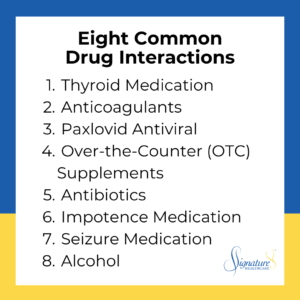Eight Common Drug Interactions Most People Don’t Know About
Some drugs don’t play well with others.
If you take two or more together, you may risk a negative interaction, putting you in a bad place health-wise. Your internal medicine physician’s job is to help you avoid harmful drug interactions, from minor discomfort to major medical issues (including early death).

Here are eight common drug interactions most people aren’t aware of but about which we internists are vigilant:
Common Drug Interaction #1: Thyroid Medication
One of the more complex common drug interactions occurs with thyroid medication.
We advise patients who use Synthroid, Levoxyl, or a thyroid supplement (like vitamin D or selenium) to take the medication on an empty stomach. That means no food, vitamins, or other medicines in your stomach for 30–45 minutes after taking thyroid medication so it can be absorbed properly.
Your medication may not be effective enough if you consume it along with food or other medicines. We may unnecessarily increase your dosage if we’re unaware you’re doing that. Then, if you begin to take your medication correctly on an empty stomach, you suddenly get an excessive dose of thyroid medication.
Common Drug Interaction #2: Anticoagulants
Patients who take anticoagulation medication (Plavix, Eliquis, Xarelto) should avoid taking other blood-thinning medicines, including anti-inflammatory drugs like ibuprofen (Advil) and naproxen (Aleve). Patients using warfarin (Coumadin) should avoid foods rich in vitamin K, which encourages blood clotting.
Even popular over-the-counter turmeric supplements have an anti-platelet effect that thins your blood, increasing your potential for bruising and gastrointestinal bleeding.
Common Drug Interaction #3: Paxlovid Antiviral
Several cardiac and seizure medications and statins are contraindicated if you take Paxlovid to treat COVID.
Statins are the most common drugs we need to pause temporarily out of concern for how the liver metabolizes the two drugs.
Common Drug Interaction #4: Over-the-Counter (OTC) Supplements
When you see your physician, mention any non-prescribed supplements you’re taking.
For example, OTC stimulants — such as ginseng, ginkgo, and Yohimbe — can affect your sleep or cause significant side effects if mixed with your prescription medications.
Common Drug Interaction #5: Antibiotics
Patients on warfarin (Coumadin) therapy are cautioned against simultaneously using antibiotics. The combination can create a high bleeding risk.
Antibiotics may also render birth control pills ineffective, so we advise patients who take them to use a secondary form of birth control.
Common Drug Interaction #6: Impotence Medication
Patients using erectile dysfunction medications (Viagra or Cialis) shouldn’t combine them with medicines containing nitroglycerin or with certain prostate medications to avoid severe drops in blood pressure (hypotension).
Common Drug Interaction #7: Seizure Medication
Anti-epileptic drugs may also be contraindicated in combination with other drugs or supplements. They can lower or heighten the effects of certain medications in the bloodstream, with unpredictable outcomes.
Common Drug Interaction #8: Alcohol
Alcohol itself is a drug, and surprisingly, it’s among the most common drug interactions most people don’t know about.
Alcohol and many anti-anxiety medications, like benzodiazepines, don’t mix. Together, they grow more potent and may result in an accidental overdose. Also, both alcohol and benzodiazepines reduce the effectiveness of antidepressants like selective serotonin reuptake inhibitors (SSRIs).
Regular alcohol drinkers should also avoid high doses of Tylenol to prevent an impact on the liver. Individuals using Lamisil to treat toenail fungus must limit alcohol for the same reason.
Connecting the Dots
In internal medicine, it’s not uncommon for a patient to take five or more medications. Every new medicine added to that patient’s regimen increases the chance of a medication reaction or drug interaction.
But here’s what distinguishes internal medicine doctors: We take an integrated look at many factors and devise a clear, informed treatment plan for you.
At Signature Healthcare, we use specialized tools to work through even complex medication lists and determine which of your prescriptions will interact safely and which may not. Our extensive programs tap related research, and we can easily adjust dosages or shift the type and class of drug we prescribe.
During your office visit, our nurses review your current medications to spot any potential overlap if you have prescriptions from a specialist outside our practice. We ensure your on-file medication list details the dose of a particular drug and how many times a day you take it. We include any supplements, vitamins, or other over-the-counter products you take.
Between office visits, you can also review your chart in our online patient portal to update your current list of medications across all your prescribers.
If we refer you to a specialist, we share a dated list of your latest medications. We’re also happy to print out medication lists if requested for easy reference when you visit a specialist.
Always keep your most recent list in your purse or wallet. You can also track and update your medications regularly using a cellphone health app.

A Word About Your Pharmacist
In internal medicine, we consider local pharmacists part of our team effort.
Your Signature doctor reviews your medication list thoroughly, but if you get all your medications at the same pharmacy, your pharmacist can also catch anything unusual or potentially risky and contact us with any questions. For example, if one doctor prescribes Celebrex and another Eliquis, a bleeding ulcer could result. But if a single pharmacy handles both prescriptions, they’ll flag the redundancy and resolve it before you take them together.
We’re Experts on Common Drug Interactions
Anything you ingest that changes or impacts your body — a prescription, a food supplement, a vitamin supplement — is technically a medication.
So, work directly with your Signature Healthcare doctor to understand potential interactions and create the best prescription and supplement regimen for your health needs. Trust us to knowledgeably weigh a medication’s benefits vs. any risks before we prescribe.
Questions about some of the most common drug interactions? We’re here with answers. Give us a call.

Michael Warren Smith, MD
Dr. Michael Smith, MD, a dedicated internal medicine specialist, has been serving Charlotte families with distinction for over 19 years. A Wake Forest University alumnus and a devoted family man, Dr. Smith balances his professional life with a passion for golf, beach travels, Peloton rides, and cheering for ACC teams, alongside his wife, Dr. Erin Smith, their two children, and Bogey, their Golden Retriever.
Get the latest News
Join the Signature Healthcare Newsletter to get the latest articles, resources, and news delivered directly to your inbox.

